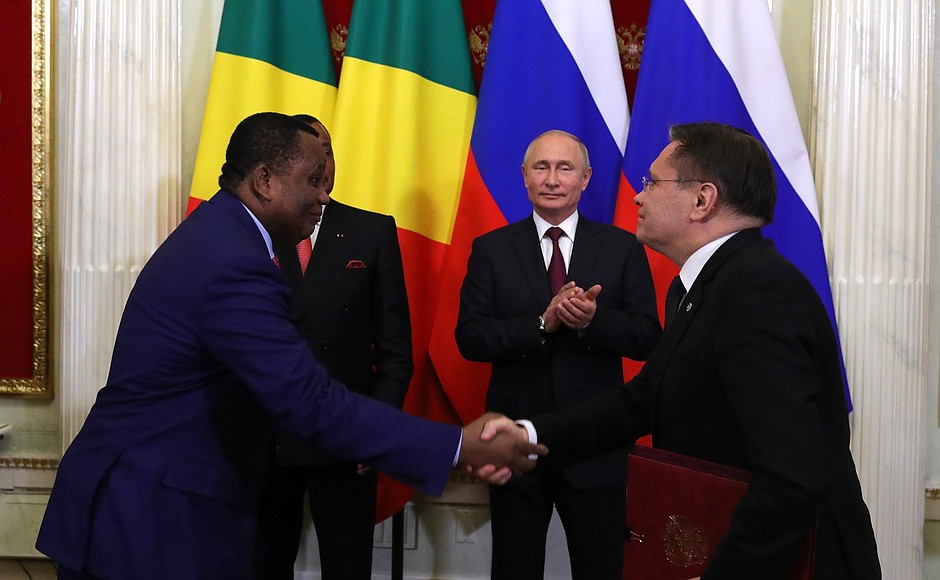Russia and the Congo business

Over the years, Russia and the Republic of Congo have had good bilateral relations. Undoubtedly, there are still prospects for strengthening these relations, especially in the economic and security spheres, as underlined during the meeting between Vladimir Putin and Denis Sassou-Nguesso in the Kremlin.ce
“It is not your first time in Russia. Our countries have always had friendly relations that have been developing this way for 55 years now. Our trade is growing – by over 60 percent – although, unfortunately, the numbers in absolute terms are still modest. But, we have good potential in several industries, such as energy, the processing industry and agriculture,” Putin said, welcoming the Congolese delegation led by President Sassou-Nguesso to the Kremlin.
It was seven years ago, precisely in November 2012, that Vladimir Putin last had an official meeting with Sassou-Nguesso, in Novo-Ogaryovo near Moscow. With high hopes to raise relations between the two countries from November 2012 when he last visited Moscow, Sassou-Nguesso, during the meeting, assertively asked Russia for support and assistance in bringing total peace in Central Africa. Central African countries include the Republic of Congo, Democratic Republic of Congo, Central African Republic, Cameroon and Chad.
“We preside over the International Conference of the Great Lakes Region. We are playing a stabilising role in Africa that can bring peace to this region. We in our country want to stabilise the situation as a whole. We hope that Russia will act side by side with us to create peace in the African region,” he said.
With regard to the economic cooperation, the Congolese leader told Putin about some steps already taken and concretely asked for Russian engagement. “You know that in economic terms there was a certain crisis associated with the decrease in oil prices. This crisis affected us, but we are gradually recovering. Now we are negotiating with the International Monetary Fund [IMF] on obtaining loans, we are negotiating with the IMF Executive Board and hope to get support in this matter from our Russian friends,” he added.
After official talks between Putin and Sassou-Nguesso, a package of documents was signed, including intergovernmental agreements on cooperation in the peaceful use of nuclear energy and mass communications.
The documents also concern the settlement of the Republic of Congo’s debt to the Russian Federation under previously issued loans, cooperation between the Russian Interior Ministry and the Congolese Ministry of the Interior and Decentralisation, cooperation in agriculture, and sending Russian military experts to the Republic of Congo.
In addition, documents on the relations between Lukoil and the State Oil Company of the Republic of Congo as well as between Pipe Metallurgical Company (TMK) and the National Petroleum Company of Congo were signed.
The TMK is Russia’s leading pipe manufacturer. The project is to build a major oil pipeline, running more than 1,300 km from the port city of Pointe-Noire in the Republic of Congo to the border with Cameroon.
Russian Deputy Defence Minister Alexander Fomin told journalists that the Republic of Congo has had a lot of Russian-made military and special hardware since the Soviet times, and some of it might yet serve for a long time for Congo’s defence capability. Russian specialists will train Congolese specialists and help them repair this hardware.
“This includes armoured and lightly-armoured hardware, rocket and conventional artillery, helicopters and so on. This hardware certainly requires professional operation, service, maintenance, repairs, and modernisation,” Fomin said.
In an interview with Itar-TASS News Agency, Sassou-Nguesso underscored that “Russia is an important country, a strategic partner that may play its role in the period when Africa is looking for cooperation in building a new world in the region, building infrastructure, new economic and security systems. The African people want to develop their economy and to establish themselves on the global arena. Russia may hold a strategic position on this issue.”
Earlier on 22 May, the Chairman of the State Duma, Viacheslav Volodin held a bilateral meeting with the President of the Republic of Congo. Volodin told him that “working within the framework of the parliamentary dimension with African countries is a priority for us. It is a pleasure that you have the opportunity to address members of the State Duma. We would like to know your proposals, which are very important for us, taking into account the necessity to develop more actively cooperation within the framework of inter-parliamentary contacts.”
The Chairman of the State Duma invited the delegation of the Congo parliament to take part in the International Forum on Development of Parliamentarism, which will be held in Moscow on 1-3 July 2019.
In his address to the State Duma, Sassou-Nguesso reminded them that he had repeatedly been in various statuses in the Soviet Union and then in Russia. “It is a great honour to be in Russia and meet old friends, as these are the prerequisites for the development of bilateral cooperation. Meeting with representatives of the Russian people is symbolic,” said the President of the Republic of Congo.
The Congolese leader proposed to strengthen the mutual strategic partnership between Russia and Congo, and assist Congo in the process of diversifying the economy in the interests and for the benefit of both countries.
“Today, Russia remains the most important player, a very active player, which undoubtedly participates in global governance in our common family of nations. And Russia should continue to strengthen strategic partnership on mutually beneficial terms and assist Congo in the process of diversifying our economy in the interests and for the benefits of the two countries,” he told the State Duma.
Last year’s growth in trade was primarily due to boosting Russia’s exports of foodstuffs and agricultural goods to Congo. Thus, bilateral trade reached US$38.4 million in 2018, according to the Russian Federal Customs Service.
*Kester Kenn Klomegah writes frequently about Russia, Africa and BRICS.
